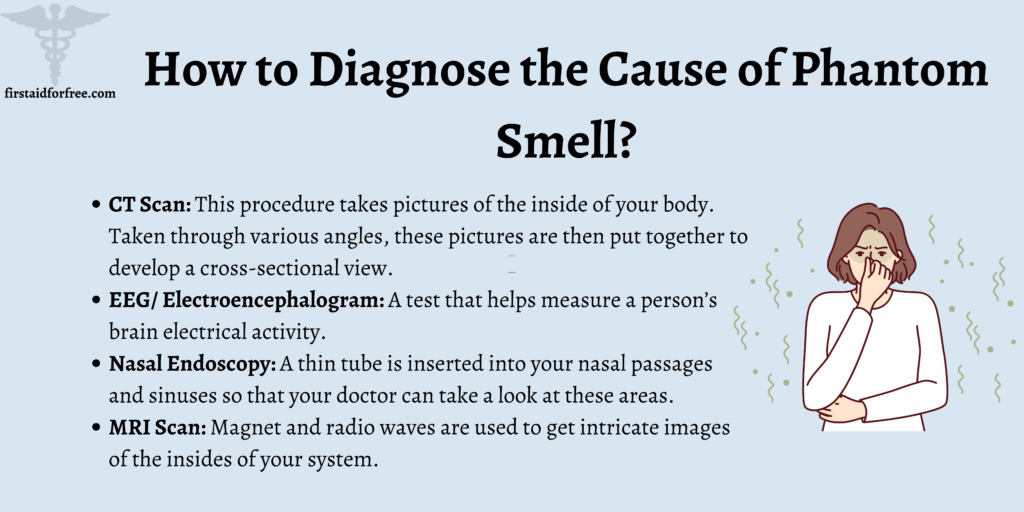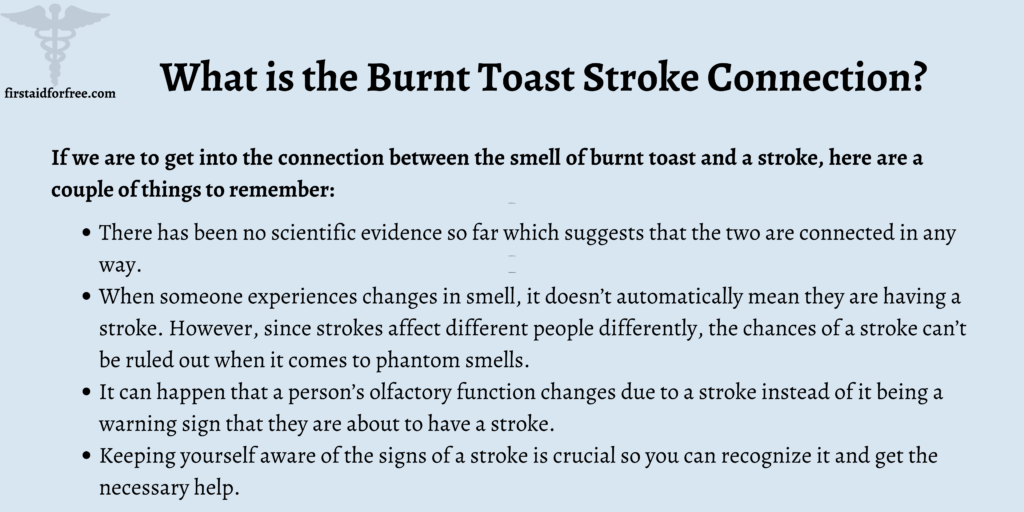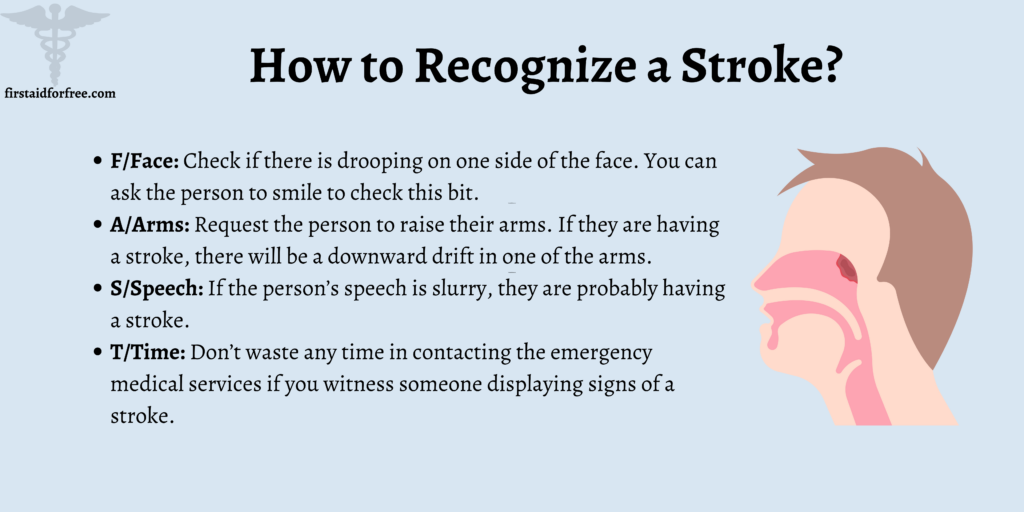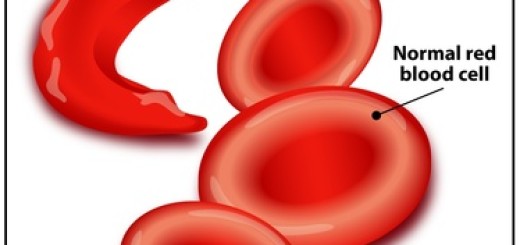Burnt Toast Stroke Connection: Here’s What You Should Know
Have you ever had a moment when you feel like you’re suddenly getting the smell of burnt toast? It could be when you’re at home watching TV or walking down the street. Well, it’s definitely not uncommon.
In fact, there is a name for this, and it’s called phantosmia. It’s an olfactory hallucination that makes you feel like you’re detecting smells when they aren’t present.
The case of the burnt toast smell is often connected to that of having a stroke. About 795,000 Americans suffer from a stroke every year, and 160,000 pass away due to causes related to strokes.
An incident from last year comes to my mind when my friend’s aunt suddenly had a stroke in the middle of a birthday party. I remember how distressed they all were as none of them were aware of what a stroke looked like and what its signs are.
Therefore, it’s crucial to understand the burnt toast-stroke connection to know the symptoms and situations to be aware of. In this article, we will discuss this subject and how you can recognize a strike, the possible causes of phantom smells, and how these causes can be diagnosed.
What is the Burnt Toast Stroke Connection?
If we are to get into the connection between the smell of burnt toast and a stroke, here are a couple of things to remember:
- There has been no scientific evidence so far which suggests that the two are connected in any way.
- When someone experiences changes in smell, it doesn’t automatically mean they are having a stroke. However, since strokes affect different people differently, the chances of a stroke can’t be ruled out when it comes to phantom smells.
- It can happen that a person’s olfactory function changes due to a stroke instead of it being a warning sign that they are about to have a stroke.
- Keeping yourself aware of the signs of a stroke is crucial so you can recognize it and get the necessary help.
How to Recognize a Stroke?
As mentioned, you must know the signs and symptoms of a stroke so that you can call for help if anyone around you ever experiences it. The ‘FAST’ test can help you recognize a stroke, and this is what the test means:
- F/Face: Check if there is drooping on one side of the face. You can ask the person to smile to check this bit.
- A/Arms: Request the person to raise their arms. If they are having a stroke, there will be a downward drift in one of the arms.
- S/Speech: If the person’s speech is slurry, they are probably having a stroke.
- T/Time: Don’t waste any time in contacting the emergency medical services if you witness someone displaying signs of a stroke.
Causes for Phantom Smells
Apart from strokes, there are other reasons as well for people to experience phantom smells. A couple of the common phantom smells, apart from burnt toast, include:
- Chemicals
- Metal
- Sulfur
- Mold
- Cigarette smoke
- Rotten food
People who have phantosmia often experience smells that are distressing or foul. Some of the reasons or causes behind phantom smells are:
- Allergies: Those with allergies experience congestion, temporarily damaging their olfactory system. This can often make you smell things that aren’t there.
- Migraine: Olfactory hallucinations can also occur as a result of migraines. Some people experience it before or during a migraine. This can last for five minutes or even an hour.
- Sinus Infection: When you suffer from a chronic sinus infection, your olfactory system could get disturbed. Merely one infection can also temporarily damage your olfactory system, leading you to experience phantom smells.
- Dental Issues: Even dental problems can cause someone to experience phantom smells, including a persistent dry mouth.
- Upper Respiratory Infection: One of the common causes of phantom smells is an upper respiratory infection, which damages the olfactory system.
- Being Exposed to Neurotoxins: Neurotoxins are very damaging to a person’s nervous system, and if you’re exposed to them for long, your sense of smell could get altered. Some of the metals that could lead you to experience phantom smells are mercury, nickel, and lead.
- Radiation Treatment: Anyone who receives radiation treatment for brain or throat cancer could experience changes in their sense of smell. This is because the healthy cells located near the cancer cells could possibly get damaged through the radiation treatment. Such changes are not permanent and usually disappear after the treatment.
How to Diagnose the Cause of Phantom Smell?

When you visit your doctor to get a phantom smell diagnosed, your healthcare provider will begin with a physical examination of your neck and head. The tests that could be recommended to you are as follows:
- CT Scan: This procedure takes pictures of the inside of your body. Taken through various angles, these pictures are then put together to develop a cross-sectional view.
- EEG/ Electroencephalogram: A test that helps measure a person’s brain electrical activity.
- Nasal Endoscopy: A thin tube is inserted into your nasal passages and sinuses so that your doctor can take a look at these areas.
- MRI Scan: Magnet and radio waves are used to get intricate images of the insides of your system.
FAQs
What are the main causes of a stroke?
The causes of strokes are related to the kind of stroke in question. Clotting disorders and heart defects are some of the causes of ischemic strokes, and the causes of hemorrhagic strokes could be high blood pressure, brain tumors, and brain aneurysms.
How can a stroke be diagnosed?
A stroke is usually diagnosed through a CT scan, ECG, or MRI scan.
Who are the ones who are at risk of strokes?
The ones who are at risk of strokes are those who are overweight, drink excessive alcohol, are physically inactive, and have high blood pressure.
Can processed meat increase the risk of a stroke?
Yes, processed meat can increase the risk of a stroke.
What are some ways to prevent a stroke?
Some of the ways to prevent a stroke are maintaining a healthy weight, limiting intake of alcohol, giving up smoking, and consuming healthy foods.
Conclusion
The following are the key takeaways from this article:
- There isn’t any scientific evidence to show a connection between strokes and the smell of burnt toast.
- One shouldn’t ignore the possibility of a stroke if they or someone around them experiences phantom smells.
- There can be numerous causes of phantom smells that aren’t related to a stroke.
- If you ever experience such smells, it’s best to diagnose them immediately.
- Knowing about the signs or symptoms of strokes helps you call for medical help immediately.







